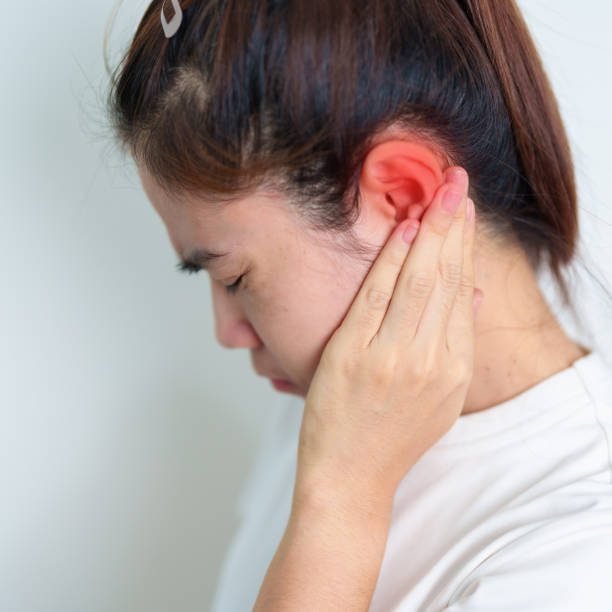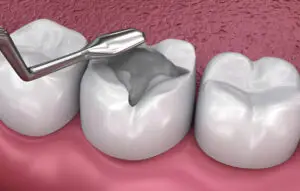Dental implants have changed how we view tooth loss. They offer a durable and good-looking solution for many. They’re a marvel of modern dentistry. They let people regain the function of lost teeth and their confidence. Yet, amidst these benefits, a question often arises: Can dental implants cause ear pain?
Understanding Dental Implants and Ear Pain
At the heart of this inquiry is the phenomenon known as “referred pain.” This is a curious case. Discomfort in one body part is caused by pain or injury in another. The jaw is close to the ears. So, dental procedures, including implants, might cause ear pain.
The Procedure Itself:
A dental implant involves placing a titanium screw in the jawbone. The screw then serves as the foundation for a false tooth. It’s a procedure celebrated for its effectiveness and safety. However, like any surgical intervention, it’s not without its risks.

The Connection to Ear Pain:
Ear pain following dental implant surgery is relatively rare, but it does happen. This discomfort is often not from the implant touching ear structures. It is from the complex nerve pathways in the face and jaw. These pathways can carry pain signals from the implant site to the ear. This can cause earache or discomfort.
Potential Causes of Ear Pain After Dental Implant Surgery
- Referred Pain: As mentioned, the pain felt in the ear might be from the implant site. This happens because of shared nerve pathways.
- TMJ Disorders: The temporomandibular joint (TMJ) is near the ears. Dental work can affect it, causing symptoms like ear pain.
- Sinus Issues: Upper jaw implants are in close proximity to the sinus cavities. Any swelling or infection can press against these cavities, causing pain that may be felt in the ears.
- Nerve Disturbance: The procedure might irritate or damage nerves near the ears. This can cause temporary or, rarely, permanent ear pain.
Addressing Ear Pain Post-Surgery
If your ears hurt after a dental implant, you must ask your dentist or oral surgeon for help. They will assess your symptoms and, if necessary, recommend an appropriate treatment plan. This discomfort is often temporary. It can be managed with over-the-counter pain relief or prescribed medication.
Prevention and Management
- Choose a Skilled Dental Surgeon: Ensure your surgeon has lots of experience with implants. This can greatly cut the risk of problems.
- Clear Communication: Tell your dentist about any pre-existing conditions. These include sinus issues or TMJ disorder. They might affect the procedure.
- Follow Post-Operative Instructions: Obeying your dentist’s advice after surgery is crucial for healing. It can help prevent unnecessary pain, including in the ears.
Common Concerns and Reassurance
It’s natural to feel a bit worried about dental implants. This is especially true with the possibility of ear pain. However, it’s important to note that such occurrences are rare. Dental implants are very safe and reliable. They are one of the best methods for replacing missing teeth. They have a success rate of over 95%.
Final Thoughts
Dental implants show how much dental technology has advanced. They offer solutions that were unimaginable just a few decades ago. The prospect of ear pain might give some pause. But, it’s a rare and manageable side effect. With the right preparation and care, dental implants have many benefits. These benefits far outweigh the small risks involved. Always consult with a trusted dentist. They will ensure that your dental decisions are informed and tailored to your needs.
Making sure your journey to a brighter smile is as easy and informed as possible is key. Remember, dental health is not just about looks. It’s a key part of your well-being.

Ready for a Brighter Smile?
We are committed to making smiles at Bridge St Aesthetic and Dental Implant Clinic. We do this with the utmost care and precision. If you’ve been considering dental implants. But, you are worried about ear pain or other side effects. Let us put your mind at ease. Our team of experienced dental professionals is dedicated to ensuring your comfort. They will do so throughout the entire process.
We understand that the decision to undergo dental implant surgery is significant. That’s why we’re here to guide you at every step. We’ll help from the first meeting to after the operation. Our clinic uses the latest dental technology. It offers safe, effective, and minimally invasive treatments.
Don’t let concerns hold you back from achieving the smile you’ve always wanted. Contact Bridge St Aesthetic and Dental Implant Clinic today to schedule your consultation. Together, we’ll explore your options and address your concerns. We’ll start a journey to a healthier, more confident you.
Your brighter smile is just a call away. Reach out to us now, and let’s make it a reality!
Frequently Asked Questions
Can dental implants cause ear pain?
Dental implants rarely cause ear pain. This discomfort is related to referred pain or TMJ issues. It is rare and often goes away on its own or with simple treatments.
How long does ear pain last after implants?
Ear pain after dental implants is usually temporary, lasting a few days to a couple of weeks. Persistent or severe pain should be evaluated by a dental professional.
What causes ear pain after dental implants?
Ear pain can come from the implant site. It can also come from TMJ disorders. Or from sinus issues. Or from nerve irritation during the procedure.
Can I prevent ear pain after getting dental implants?
Choose an experienced dentist. Tell them of any pre-existing conditions. Follow their post-op instructions. This can help reduce the risk of ear pain.
What should I do if I experience ear pain after implants?
Consult your NHS dentist or oral surgeon if you experience ear pain. They can assess the situation and recommend appropriate treatment if necessary.
Also read: Can You Be Put to Sleep for Dental Implants in the UK?






